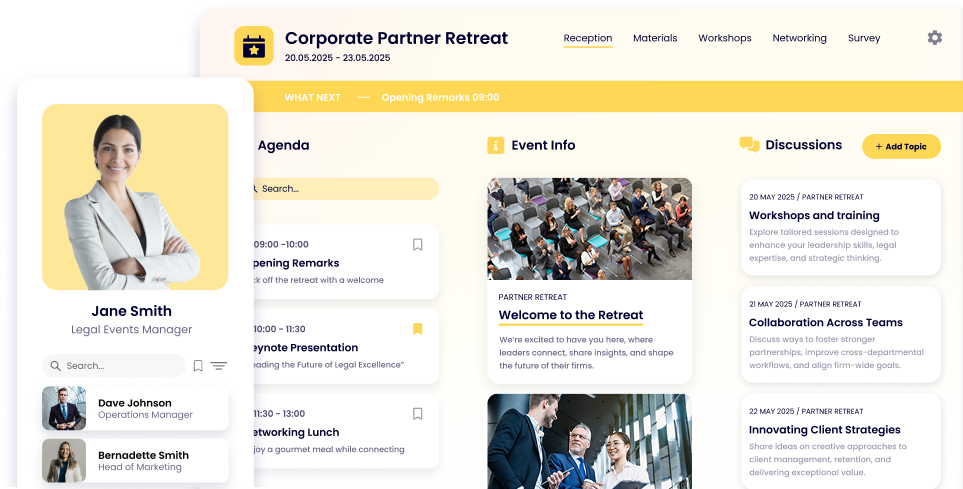How to Create a Successful Event Strategy [Guide 2024]

Lisa Broom | Head of Marketing

The power of events in building brands and generating interest is well known. But people still struggle to come up with a compelling event strategy that they can use.
And yet, everything from small gatherings to multi-day, industry-wide conferences require a strong event strategy plan to succeed.
Let’s explore the essential components of strategic event planning, ensuring your event not only meets but exceeds expectations. It’s all here in our ultimate event strategy guide!
Key Takeaways
- Understand what an event strategy is and why it’s crucial.
- Learn the steps involved in creating a successful event strategy plan.
- Discover tips and techniques for effective event strategy techniques.
- Explore how to adapt your event strategy for different types of events.
What is an Event Strategy?
An event strategy is a comprehensive plan that outlines the objectives, target audience, budget, and timeline for an event. It serves as a roadmap, guiding every decision from initial concept to post-event evaluation. By setting clear goals and aligning every aspect of the event with these objectives, an event strategy ensures a cohesive and focused approach to event management.
Pre-event Market Research
Before diving into the details of your event, conducting thorough market research is crucial. Understanding the market landscape, including competitor events, industry trends, and audience preferences, helps you identify gaps and opportunities.
This research provides valuable insights into what your target audience is looking for and how you can tailor your event to meet those needs. By analyzing market data and feedback, you can develop a strategy that resonates with your audience and sets your event apart from the competition.
Design
The design of your event plays a significant role in shaping the overall experience. From the visual aesthetics to the layout and branding, design elements should reflect the event’s theme and objectives.
Consider the attendee journey and how design can enhance their experience, from registration to participation. Thoughtful design creates a cohesive atmosphere that aligns with your event’s goals and leaves a lasting impression on attendees.
Planning with the End in Mind
When setting event strategies, it’s essential to start with the end in mind. Define the desired outcomes and success metrics for your event, such as attendee satisfaction, engagement levels, or revenue targets.
By establishing clear goals from the outset, you can work backward to ensure every decision and action supports these objectives. This approach helps maintain focus and ensures that your event strategy remains aligned with the intended outcomes throughout the planning process.
Think Long and Hard About the Event Venue
Selecting the right venue is a critical component of your event strategy. The venue sets the tone for the event and can significantly impact the attendee experience. Consider factors such as location, capacity, accessibility, and amenities when choosing a venue.
Think about how the space aligns with your event’s theme and goals. A well-chosen venue enhances the overall atmosphere and ensures that attendees feel comfortable and engaged.
Programming Should Emphasize Value to Audience and Respect Their Time
The content and programming of your event are at the heart of delivering value to your audience. Focus on creating sessions, workshops, and activities that align with attendee interests and provide meaningful insights.
Respect your audience’s time by ensuring that programming is relevant, engaging, and concise. Thoughtful programming not only keeps attendees engaged but also reinforces the event’s objectives and enhances the overall experience.
Promote by Discovering the Most Exciting Elements
Promotion is a vital aspect of your event strategy, and identifying the most exciting elements of your event can drive interest and attendance. Highlight unique features, such as keynote speakers, exclusive sessions, or interactive experiences, in your marketing efforts.
Leverage social media, email campaigns, and partnerships to generate buzz and excitement. By focusing on what makes your event stand out, you can attract a larger audience and increase engagement.
Synthesize It All into an Operational Plan
Once you have outlined the key components of your event strategy, it’s time to synthesize them into a comprehensive operational plan. This plan should detail every aspect of the event, from logistics and scheduling to marketing and execution. Clearly define roles and responsibilities, establish timelines, and outline contingency plans to ensure a smooth and successful event. An operational plan serves as a blueprint, guiding your team through each phase of the event and ensuring that every element aligns with your overall strategy.
Why Do You Need an Event Strategy?
Implementing an event strategy is crucial for several reasons:
- Clarity and Focus: It provides a clear vision and direction. This is probably the single most important element when learning how to create an event strategy.
- Resource Allocation: Helps in effective budgeting and resource management. Best event strategy practices involve building in some padding, as costs often exceed initial expectations.
- Risk Management: Identifies potential risks and outlines mitigation.
- Evaluation and Improvement: Facilitates post-event analysis to improve future events, ensuring even better event strategy solutions next time.
In our corporate event planning article, we delve deeper into the importance of a solid plan before execution.
Event Strategy Guide: How to Successfully Plan An Event
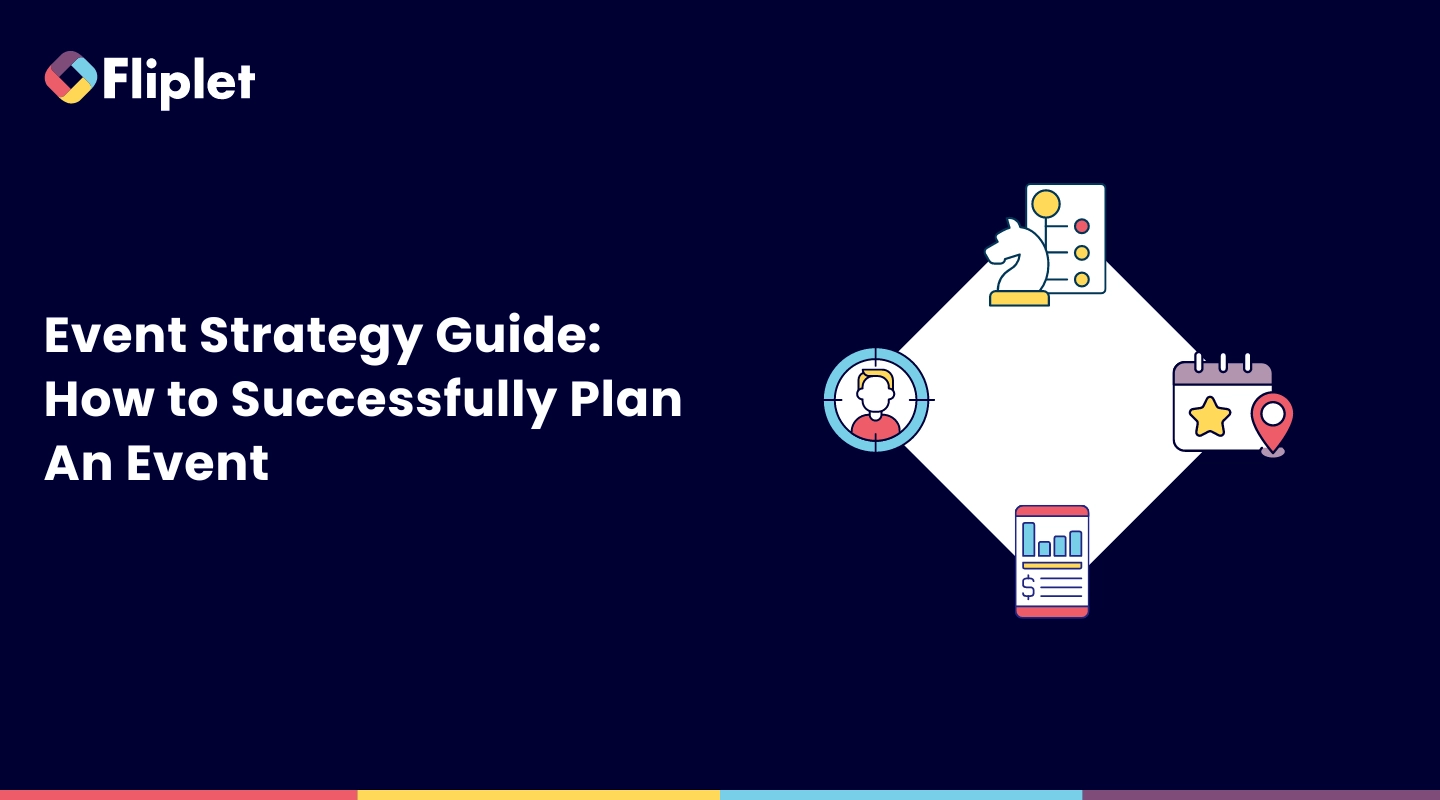
Creating a successful event strategy begins with a well-thought-out plan that encompasses every aspect of the event. From defining your objectives to executing the event flawlessly, each step requires careful consideration and meticulous planning. Here’s how you can craft a comprehensive event strategy:
Set the Event Goal or Vision
The cornerstone of any successful event strategy plan is a clear and defined goal. Your event’s objectives will guide every decision you make, from selecting the venue to crafting your marketing message.
Whether your aim is to educate, entertain, or promote, having a focused vision ensures that all elements of your event align with these objectives. Clarity in strategic event planning not only aids in effective execution but also helps in measuring success post-event. Consider what you want your attendees to gain from the event and how it aligns with your broader organizational goals.
Know Your Audience
Understanding your audience is crucial to tailoring the event experience to their needs and expectations. Start by identifying who your target audience is and what they value most. Conduct surveys, analyze demographic data, and review feedback from past events to gather insights.
Knowing your audience allows you to create content and experiences that resonate, leading to higher engagement and satisfaction. It also informs your marketing strategy, helping you reach your audience where they are most active and receptive. In this way, event strategy solutions are marketing solutions, too.
Segment Your Market
Market segmentation is a powerful tool for creating personalized experiences that resonate with diverse audience groups. By dividing your audience into segments based on characteristics such as age, location, interests, or purchasing behavior, you can tailor your messaging and offerings to meet specific needs.
This approach enables targeted marketing, ensuring that your communications are relevant and impactful. For example, you might offer different ticket packages, exclusive sessions, or tailored content streams to different audience segments, enhancing their overall experience and increasing the likelihood of success in your event strategy plan.
Plan Your Budget
Creating a detailed budget is a critical step in strategic event planning, as it ensures you allocate resources effectively and avoid financial pitfalls. Start by identifying all potential expenses associated with your event. Common categories include venue rental, catering, marketing, staffing, technology, and entertainment. Each of these areas should be carefully considered and prioritized based on your event goals.
One area where costs can be significantly reduced is in the development of an event app. Traditionally, creating a custom app from scratch can be costly, requiring significant investment in development, testing, and maintenance. However, using a tool like Fliplet can offer a more budget-friendly alternative. Fliplet allows you to build a customized event app quickly and efficiently, without the need for extensive coding skills or resources. This can result in considerable savings, freeing up your budget for other event priorities.
Here’s a sample budget for a medium-sized corporate event to illustrate how funds might be allocated in your event strategy:
Sample Budget for a Corporate Event
| Category | Estimated Cost | Notes |
|---|---|---|
| Venue Rental | $10,000 | Includes space for 200 attendees |
| Catering | $8,000 | Buffet style with vegetarian options |
| Marketing | $5,000 | Social media ads, email campaigns |
| Staffing | $4,000 | Event coordinators and support staff |
| Technology | $3,500 | AV equipment, Wi-Fi, and tech support |
| Entertainment | $2,000 | Guest speaker and live music |
| Decorations | $1,500 | Thematic decor and signage |
| Transportation | $1,000 | Shuttle service for attendees |
| Printing | $500 | Programs, name badges, and signage |
| Subtotal | $35,500 | |
| Contingency Fund | $3,550 | 10% of total budget |
| Total Budget | $39,050 |
By planning your budget meticulously and allowing for flexibility, you can ensure that your event is both successful and financially sustainable. This approach not only prevents overspending but also enhances the overall quality and impact of your event.
Outline Your Timeline
A well-structured timeline is key to staying organized and ensuring smooth execution. Break down your event planning process into key milestones and deadlines, such as booking the venue, confirming speakers, and launching marketing campaigns.
In your event strategy, establish clear timelines for each task and assign responsibilities to team members. Regularly update your timeline to reflect any changes and keep everyone informed. A detailed timeline minimizes stress and allows you to focus on delivering a seamless event experience.
Design a Marketing Plan
A comprehensive marketing plan is vital for attracting attendees and generating excitement. (And as we mentioned above, it needs to be deeply tied to your event strategy plan.)
Utilize a mix of digital and traditional marketing strategies to reach a broader audience. Leverage social media platforms, email campaigns, content marketing, and partnerships to spread the word about your event.
A recent Quora discussion found several people chiming in over and over with the same general theme. They all emphasized establishing your goals and key performance indicators (KPIs) first and foremost. Make sure these are measurable, so you can see if you succeeded after the event.
Everything else in your event strategy flows from having clear, measurable goals.
Looking for a good option? Our marketing app offers tools to streamline your efforts, from scheduling posts to analyzing campaign performance. Incorporate insights from discussions on key elements of event marketing strategy, emphasizing creativity, engagement, and the unique value proposition of your event.
Manage the Event Execution
Setting event strategies is key. But they only help if you execute them properly. That requires meticulous coordination of all logistical aspects. From setup to breakdown, ensure that every detail is planned and communicated effectively. Assign clear roles and responsibilities to team members and conduct rehearsals to identify potential issues.
Effective communication and teamwork are crucial to ensuring everything runs smoothly—and that starts from the strategic event planning phase all the way to cleaning up afterward. Have contingency plans in place to address any unforeseen challenges, and maintain flexibility to adapt as needed. A well-executed event leaves a positive impression on attendees and reinforces your brand’s credibility.
Review and Reflect
After the event, it’s important to take the time to review and reflect on its success. Gather feedback from attendees, sponsors, and team members to gain insights into what worked well and what could be improved. Analyze key metrics, such as attendance numbers, engagement levels, and financial performance, to assess the event’s impact.
A thorough evaluation provides valuable insights for refining your event strategy and enhancing future events. Use this feedback to make data-driven decisions and continuously improve your approach, ensuring each event is better than the last.
Top Business Event Strategy Tips for the Perfect Execution
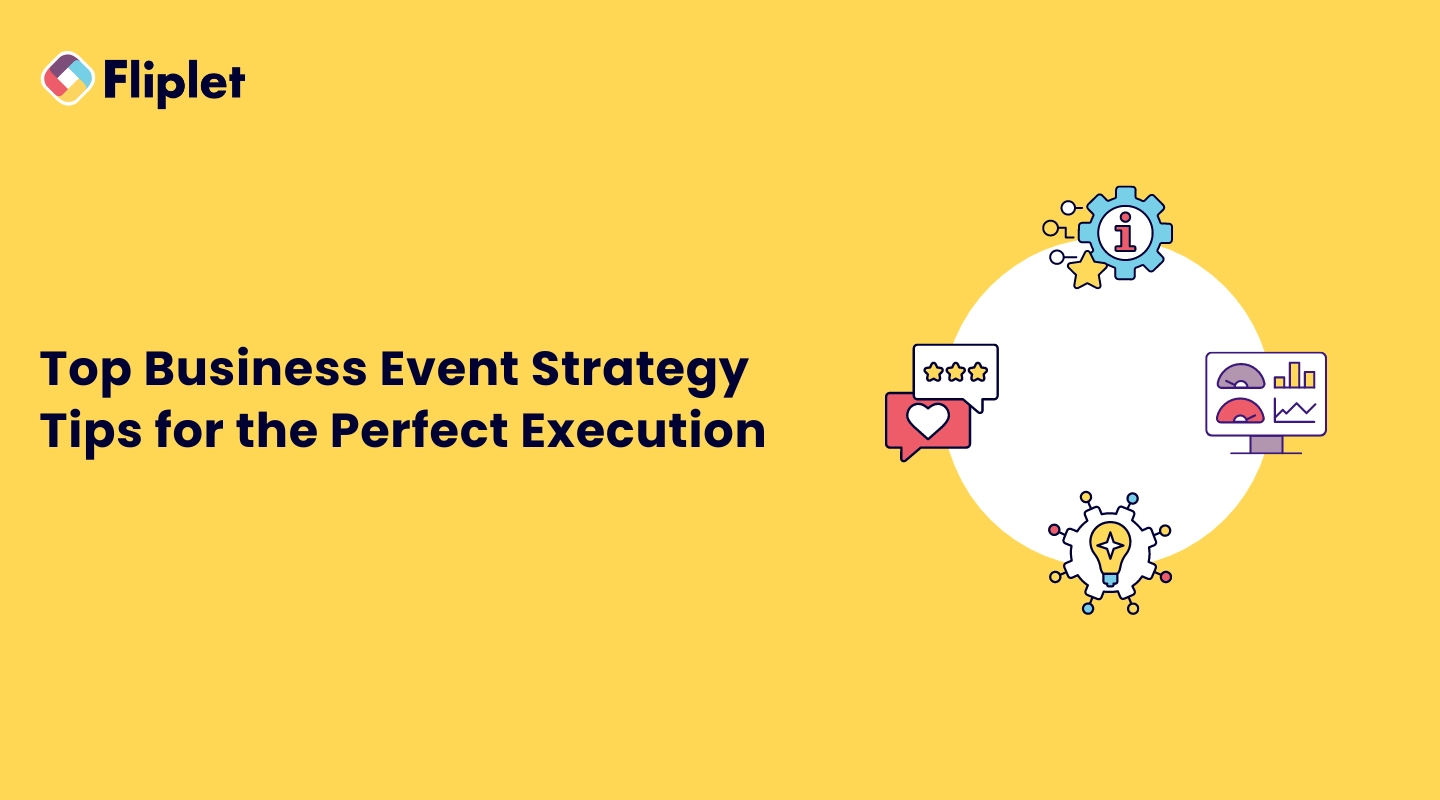
To achieve flawless execution, consider event strategy for business specifically. This includes:
Integrate Innovative Technologies
Leveraging technology can enhance your event strategy framework. Our brainstorming app facilitates idea generation and collaborative planning, streamlining the creative process. Innovative tools and platforms can boost efficiency and improve the overall event experience.
Integrate Event Strategy Techniques
Employing various event strategy techniques can optimize your approach. From interactive workshops to live demonstrations, incorporating diverse formats keeps attendees engaged and enhances learning.
Stay Adaptable
Flexibility is key in responding to unexpected changes or challenges. Stay adaptable by having backup plans and being open to feedback. A flexible approach ensures your event strategy solutions remain relevant and effective.
Listen More Than You Speak
Listening to attendee feedback and insights can inform setting event strategies in the future. Encourage open communication and actively seek input from participants, ensuring your event meets their needs and expectations.
Track the Progress
Monitoring progress throughout the event lifecycle is crucial for identifying successes and areas for improvement. Utilize analytics tools to track engagement, attendance, and other key metrics, ensuring your event strategy remains on target.
Because this offers the best way to pursue ongoing improvements, it’s one of the essential (though often overlooked) best event strategy practices.
Event Marketing Strategy
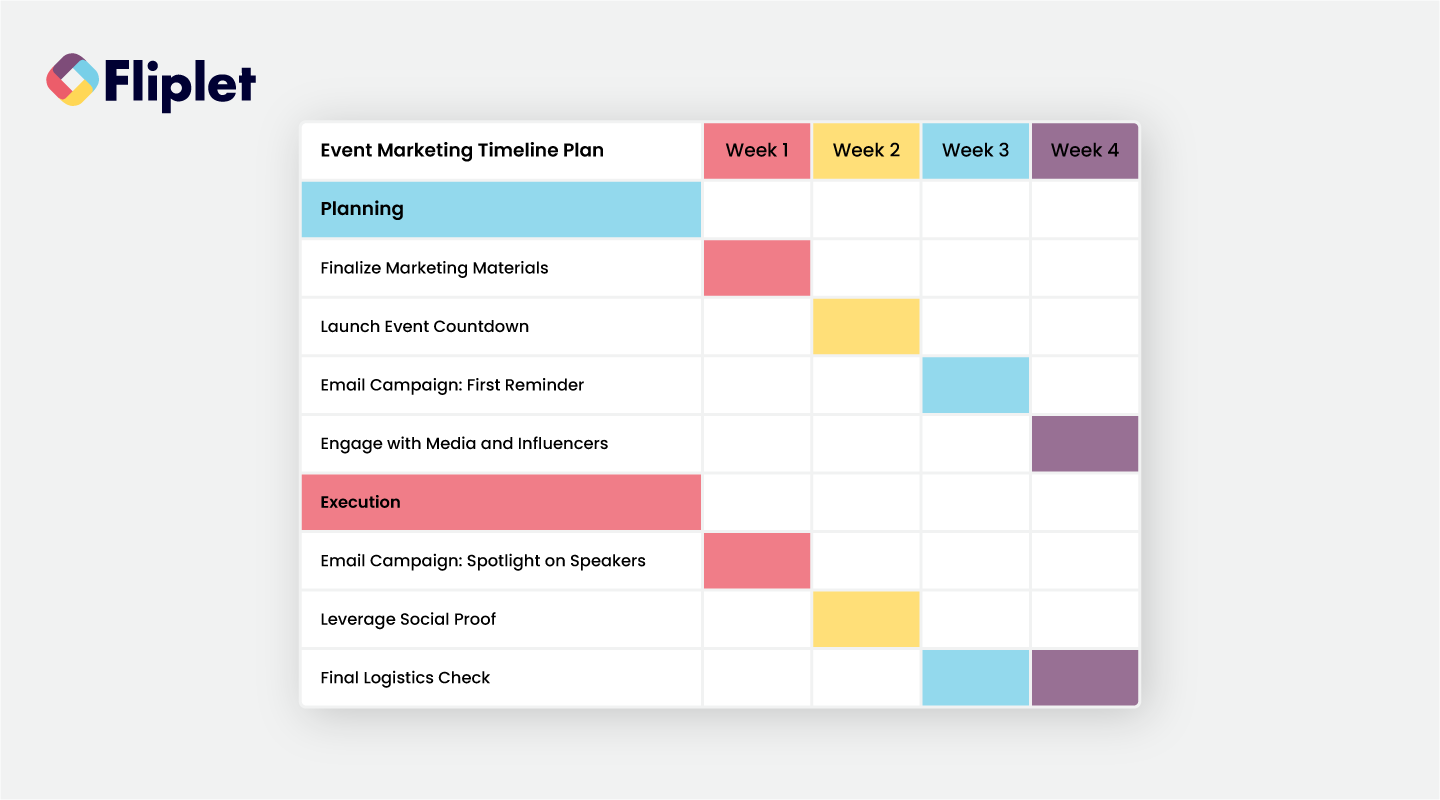
A successful event marketing strategy involves promoting your event through various channels to reach a wider audience. Consider using social media, email marketing, and partnerships to generate excitement and increase attendance.
As we’ve mentioned a couple of times in this event strategy guide, marketing is interconnected to this entire process.
Want to learn more about making an event marketing plan? Check out our in-depth guide.
How to Change Your Event Strategy Depending on the Event Type
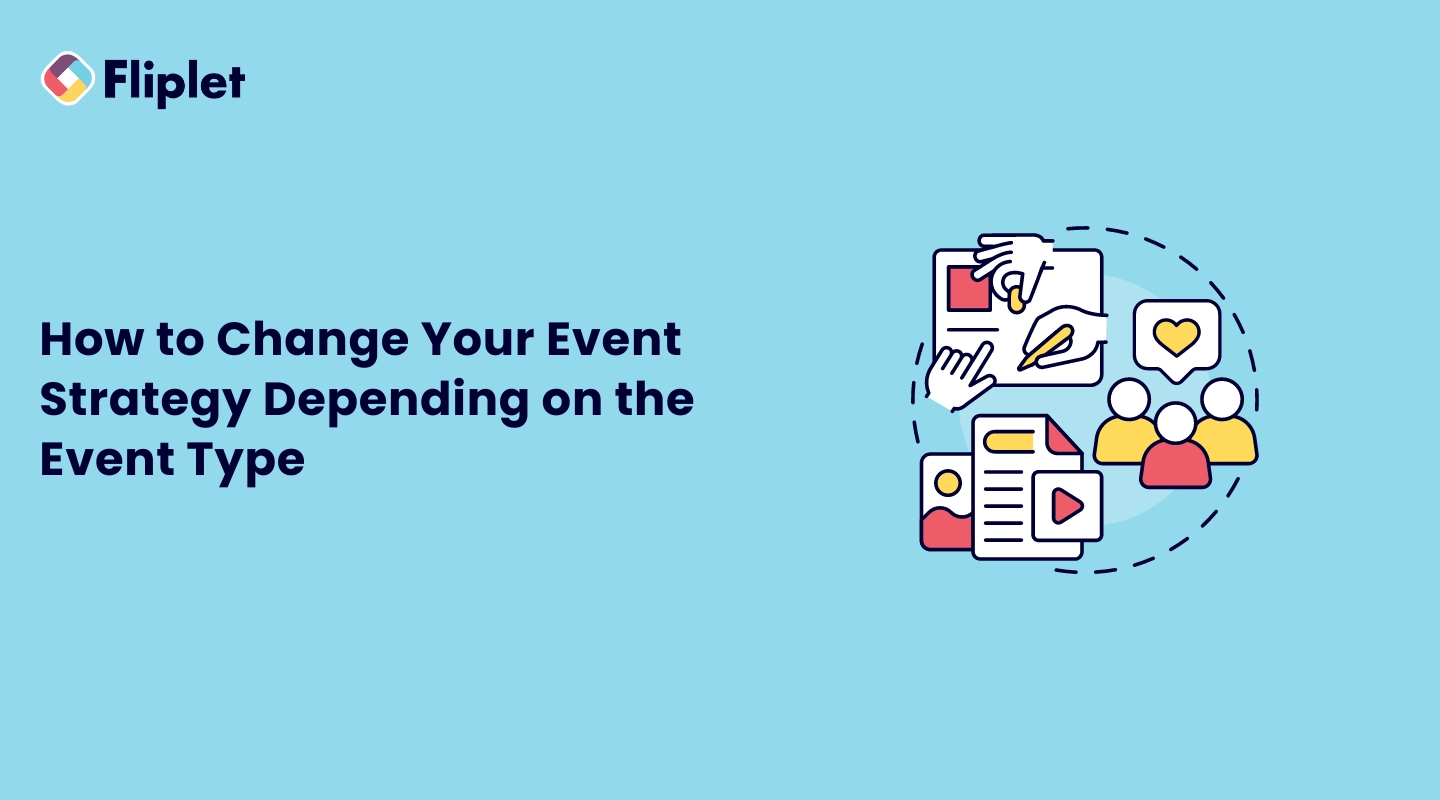
Adapting your event strategy based on the type of event is essential for achieving optimal results. Here are some strategies for different event types:
Virtual Event Strategy
Virtual events require a strong digital presence and engagement tactics. Utilize interactive features, such as polls and Q&A sessions, to keep attendees involved and connected.
Conference Event Strategy
Conferences demand a structured approach with a focus on content delivery and networking opportunities. Ensure a diverse lineup of speakers and ample time for interaction for optimal strategic event planning.
Partner Event Strategy
Collaborative events with partners require clear communication and shared goals. Establish a unified vision and coordinate efforts to create a seamless experience.
Hybrid Event Strategy
Hybrid events combine in-person and virtual elements, offering flexibility and accessibility. Ensure a cohesive experience for all attendees, regardless of their participation method.
Corporate Event Strategy
Corporate events prioritize professionalism and brand alignment. Your event strategy plan should focus on delivering a polished experience that reflects your company’s values and objectives.
B2B Event Strategy
B2B events emphasize relationship-building and networking. A successful event strategy for business creates opportunities for meaningful connections and facilitate conversations that drive growth.
Engage Your Attendees With an Event App
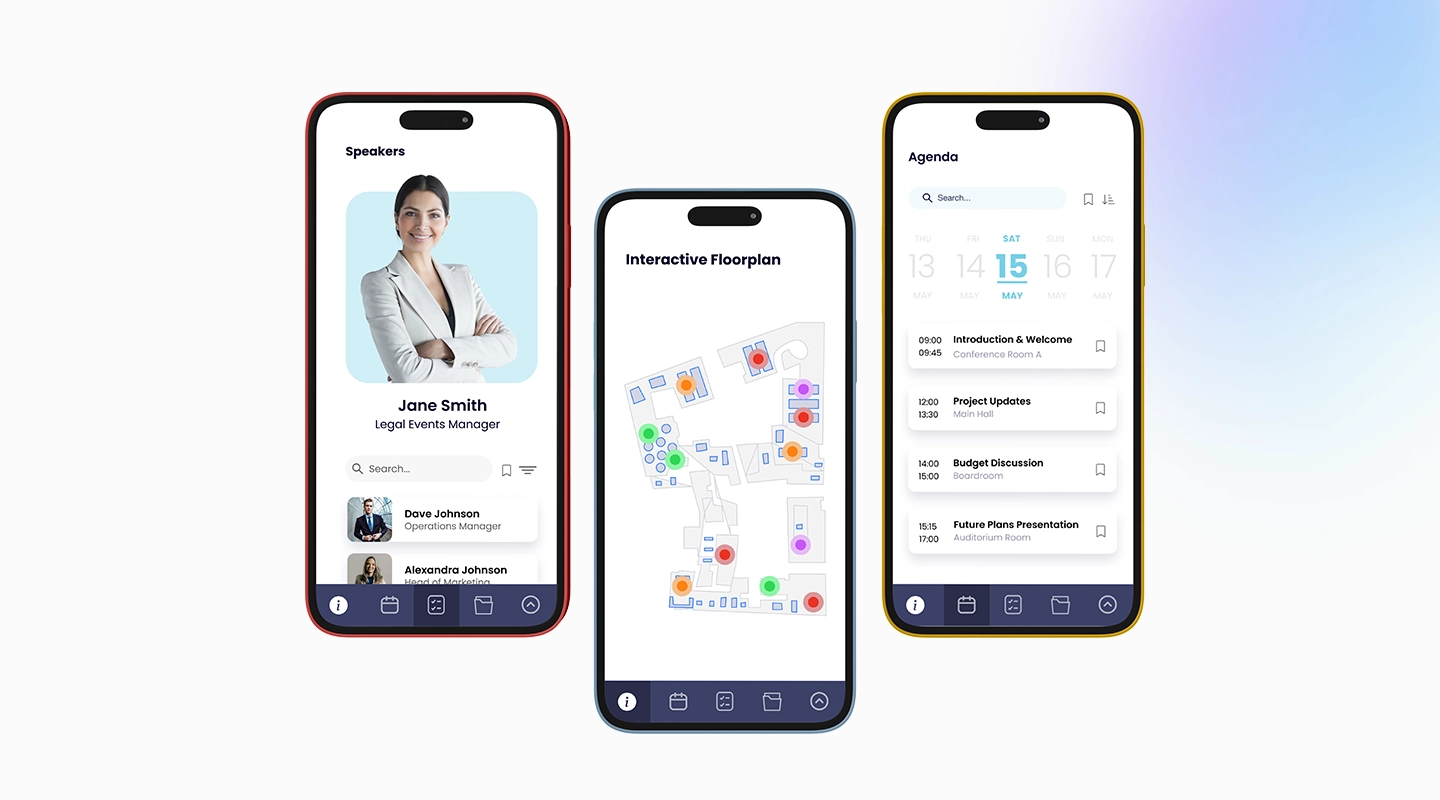
Utilizing an event app builder can enhance attendee engagement and streamline event management. Our app offers features such as real-time updates, interactive maps, and personalized schedules, ensuring a seamless experience for participants.
And because it’s Fliplet, you can do all this in the same app that you communicate with your team, gather attendee feedback, and more!
The options are limitless. See for yourself today by making your first app for free.
FAQs
In what ways can Fliplet’s apps enhance my event planning and execution?
Fliplet’s apps offer comprehensive tools for planning, marketing, and executing events, ensuring a streamlined and efficient process.
How to create a quality event strategy in a short amount of time for my small business?
Focus on setting clear goals, understanding your audience, and utilizing technology to expedite planning and execution.
What tips can businesses use to fasten their event strategy planning process?
Streamline processes with technology, prioritize key tasks, and maintain open communication with your team.
How should businesses develop a detailed timeline to ensure the success of their event strategy?
Outline key milestones, set realistic deadlines, and regularly review progress to stay on track.
How to create an event strategy?
Develop a comprehensive plan that includes goals, audience insights, budget, and timeline to guide every aspect of your event.




